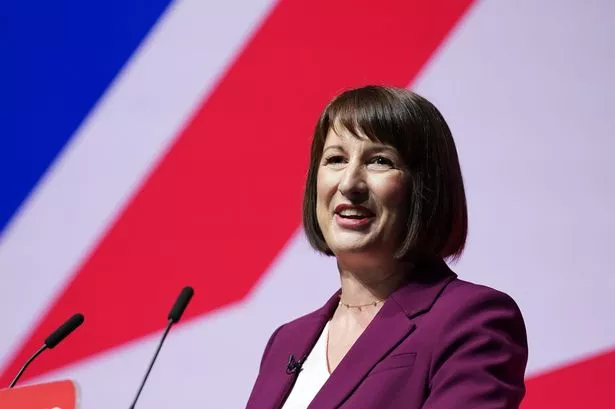OnPath Energy acquires wind farms in first deal since being formed

Renewable energy firm OnPath Energy has acquired two operational wind farms in its first deals since being formed.
The Sunderland company, which was previously the renewable energy wing of Banks Group until it was bought by Brookfield Asset Management in 2023, has acquired the Milton Keynes wind farm in Buckinghamshire and the Pates Hill wind farm in West Lothian from GCP Infrastructure Investments. The two sites have been operational since 2010 with a capacity of around 28MW, enough to power around 23,000 homes.
The deal means OnPath now owns and operates 12 onshore wind farms across Scotland and England while it also starting work this year on two new wind farms, one in Scotland and one near Leeds. The Yorkshire development will also have an associated solar and battery scheme.
The company also has more than 3GW of renewable energy generation and electricity storage capacity in its development pipeline plus planning permission for up to 368 MW of renewable electricity generation and flexible energy storage projects.
Richard Dunkley, CEO at OnPath Energy, said: “As we continue to develop our own renewable generation projects from first principles, we will also be looking to identify other opportunities at every stage of the lifecycle, from pre-construction right through to operational wind farms and project repowering.
“The Milton Keynes and Pates Hill Wind Farms represented a strong fit with our development framework and their acquisition provides a positive outcome for all concerned, including the local communities that will continue to benefit directly from the revenues that these wind farms generate.”
Philip Kent, chief executive officer at Gravis Capital Management, said: "GCP invested in the Milton Keynes and Pates Hill wind farms in 2017. Since, these assets have provided attractive returns for GCP’s shareholders, generated a significant amount of renewable energy to support UK decarbonisation, and have contributed positively to the local area.
“Among other initiatives, the projects have helped fund improvements to the outdoor space at the Kirknewton Primary School and worked with teachers to educate children about how the wind turbines work. We are pleased to be selling the wind farms to OnPath Energy, who we are sure will be excellent stewards of the assets and will continue to create benefits for all relevant stakeholders.”
Recommend


Enterprise
Good Energy poised to be acquired by UAE-based Esyasoft in deal valuing business at nearly £100m
Wiltshire renewable provider Good Energy is poised to be acquired by a UAE-based company in a deal valuing the business at £99.4m. In a stock market announcement on Monday, January 27, the Chippenham-based green energy provider said it had reached an agreement with the board of Esyasoft on the terms of a recommended cash offer. The deal follows an unsolicited takeover approach by Dubai-headquartered Eysasoft, which describes itself as a smart grid technology company, last October. At the time, Good Energy said the offer price of 412p per share was "not a fair reflection" of the future growth opportunities of the business. Under the terms of the acquisition deal, each Good Energy shareholders will receive 490p in cash per share. The Esyasoft Group has operations in UAE, the UK, Europe and India. It was founded by Bipin Chandra in 2014 and has been a subsidiary of Sirius International Holding since 2023. Sirius is one of the principal operating subsidiaries of International Holding Company - the investment firm chaired by the son of UAE’s founder Sheikh Tahnoun bin Zayed Al Nahyan. Good Energy was established in 1999 by Juliet Davenport as a challenger supplier to major energy companies such as British Gas. It now has 245,000 customers and has expanded to offer services including solar panel installation. It has also invested in electric vehicles and has a stake in Bristol-based EV charging app Zapmap. Ms Davenport said on Monday the deal represented an opportunity to scale Good Energy's propositions. "[The acquisition will lead to] the decentralised and flexible clean power offering for the prosumers of the future to make a real difference to climate change." Nigel Pocklington, chief executive of Good Energy, added: "Whilst the board remains confident in Good Energy's strategic delivery as a publicly listed company, Esyasoft's financial resources, in addition to its presence in new markets, present a significant increase in our potential." Mr Chandra, chief executive and founder of Esyasoft Holding, said: "What strikes us about Good Energy is how aligned it is both strategically and culturally with our own business. Good Energy, like Esyasoft, is driven by a vision to deliver a smart, green and sustainable energy future for all. He added: "We believe that through our strategic partnership, we can support Good Energy in accelerating delivery of its purpose and growth ambitions by realising the extensive opportunities that exist for this business both in the UK and internationally." Good Energy said its board would recommend the offer to shareholders.


Enterprise
Sheffield battery firm seals $7m funding to roll out clean energy tech in Africa
A Yorkshire battery tech company has secured $7m in funding to accelerate its work in Africa. Sheffield-based Mobile Power (Mopo) uses solar powered hubs and local agents to rent out batteries to customers with limited access to power, with a pay-per-use battery sharing service that is affordable to all, ensuring homes, electric vehicles and small businesses can connect with clean energy. Now the sustainable energy firm has secured funding from British International Investment, the UK’s development finance institution and impact investor, allowing it to ramp up expansion of its battery rental business in the Democratic Republic of Congo, which is a key growth market. Mopo launched its operations in Democratic Republic of the Congo in the second quarter of last year and already operates across six cities. The financing from BII’s Climate Innovation Facility will help the company to treble its service capacity in the republic within the next 12 months, while also reaching over a million people. Mopo wants to revolutionise access to sustainable energy for households and businesses in urban and rural communities in Africa by offering two types of battery rentals, a compact one for lighting, phone charging, and powering DC appliances, and a larger battery designed to power larger 230V appliances, replacing petrol generators. CEO Chris Longbottom said: “We are delighted to collaborate with BII, which has acknowledged the significance of our innovative pay-per-use battery rental model. At Mopo, our mission is to create a high-impact, sustainable solution that empowers households and small businesses by providing access to electricity without the burden of costly upfront equipment purchases. "This partnership aligns perfectly with BII’s mandate to finance initiatives that drive social and economic development. Together, we aim to make clean, affordable energy accessible to those who need it most, fostering growth within the communities we serve.” He said the planned expansion is critical because less than 17% of the population currently has access to electricity. Mr Longbottom added: “We recently achieved a significant milestone, surpassing 23 million rentals across Sub-Saharan Africa, with the DRC emerging as one of our key growth markets. With a population exceeding 100 million and over 80% lacking access to electricity, the need in this country for our service is both compelling and substantial. This financing from BII marks the beginning of what we envision as a long-term partnership, enabling us to accelerate our ambitious growth strategy in the DRC and make a transformative impact on the lives of millions by delivering reliable and affordable energy solutions.” Chris Chijiutomi, managing director and head of Africa at BII, said: “Imagine a battery, that can power everything from phones to fridges, lights and larger appliances, enabling businesses even in the most remote locations, to thrive when the supply of electricity is non-existent or unreliable. This is why backing energy access is a key priority for BII to drive sustainable economic growth, particularly in Africa’s frontier markets including DRC. "By supporting innovative businesses like Mopo, we aim to create more early-stage solutions to address significant energy deficits across the continent. We look forward to supporting Mopo as it delivers on its expansion plans and makes access to energy possible for more Africans.” Lord Collins of Highbury, UK Minister for Africa said: “This innovative partnership between British International Investment and Mopo demonstrates how UK expertise and investment can help unlock sustainable economic growth in Africa. By bringing reliable, clean energy solutions to households and businesses, we’re driving green development while creating opportunities for UK and African businesses alike.


Enterprise
ONS chief Sir Ian Diamond confident in UK's rising health-related economic inactivity data
Professor Sir Ian Diamond, the UK’s national statistician, has expressed strong confidence that the UK is experiencing a surge in health-related economic inactivity, despite doubts over data quality. He stated that the Office for National Statistics (ONS) findings on health-related inactivity align with various other figures from the Department for Work and Pensions (DWP) and the NHS, all indicating an increase in inactivity due to ill health, as reported by City AM. According to ONS data, the number of people economically inactive due to ill-health has risen to 2.8 million, up from 2.1 million in the last quarter of 2019. "What we have reported, and what we stay with, is an increase in inactivity linked – not always, but often – to mental ill health amongst young people," Diamond explained. He also noted a "flight from the labour force" among those over 50, attributed to the growing prevalence of cardiovascular, musculoskeletal and mental health conditions. However, the ONS has faced criticism for declining response rates to its key labour force survey, which provides data on employment, unemployment and inactivity in the economy. Independent research by the Resolution Foundation, published in November last year, suggested that as many as 900,000 more people were employed than official figures suggest, implying that the employment rate would be on par with its pre-pandemic level. Huw Pill, chief economist at the Bank of England, has suggested that the Bank’s own work on the topic suggests inactivity has remained fairly constant. In response to questions about his confidence in the inactivity figures, given broader issues with the survey, Diamond asserted, "Please, please, please don’t think I am being complacent. I lie awake at night worrying about this the whole time." He clarified that the Resolution Foundation’s analysis began with a distinct population base compared to the one the ONS used at the time. "It’s a bit like trying to compare Torquay United with Manchester City: Its not a very sensible comparison," he noted. The think tank’s study also entailed certain assumptions regarding self-employment and jobless individuals, which Diamond believed the ONS should not make.


Enterprise
Lake District hotel bought by growing hospitality group Kronen Collection
The owner of Newcastle luxury hotel Jesmond Dene House has expanded its reach by snapping up a Lake District site. The Jesmond hotel was bought by Kronen Hotels Ltd in October 2023 after the owners decided to retire for an undisclosed sum. Now the business, which trades as Kronen Collection, has added to its portfolio through the acquisition of Borrowdale Gates Hotel, a historic country hotel set in three acres of wooded grounds in the Borrowdale Valley, close to Keswick. The 19th Century originally operated as a country retreat for travellers seeking solace while surrounded by Cumbria’s natural beauty, but over the years it has earned a reputation for its fine dining and boutique-style luxury. A spokesman for Kronen Collection, which also operates The Crown Hotel in Wetheral, which has recently been refurbished, and Kilbirnie Hotel in Newquay, said: “We’ve always been passionate about expanding our portfolio with unique properties that offer both charm and exceptional location. "Borrowdale Gates is an outstanding addition due to its rich history, stunning location in the Lake District, and the potential to provide guests with a truly authentic experience in one of the UK’s most picturesque regions.


Enterprise
Impending tax rises temper business confidence - report
The impact of tax rises weighed heavily on Greater Birmingham businesses during the final quarter of 2024, according to newly published research. The report, published by Greater Birmingham Chambers of Commerce for quarter four, reveals concerns among firms following business tax increases announced in the Chancellor's Autumn Budget. This led to a fall in recruitment activity and the significant increase in the number of companies expressing concerns over price pressures. However, there were signs of resilience from the region's businesses, with both domestic and export activity picking up towards the end of the year. Email newsletters BusinessLive is your home for business news from across the West Midlands including Birmingham, the Black Country, Solihull, Coventry and Staffordshire. Click through here to sign up for our email newsletter and also view the broad range of other bulletins we offer including weekly sector-specific updates. We will also send out 'Breaking News' emails for any stories which must be seen right away. LinkedIn For all the latest stories, views and polls, follow our BusinessLive West Midlands LinkedIn page here. The report, produced in partnership with Birmingham City University, revealed 47 per cent of firms increased their UK sales (up by seven per cent in quarter three), although nearly one in five (19 per cent) reported a decrease. Export activity, which lagged behind domestic sales throughout 2024, showed signs of improvement in quarter four, the report says, with 33 per cent of companies reporting an increase in sales, custom and bookings - the highest level since the second quarter of 2023. Meanwhile, data suggests employer cost implications arising from the 2024 Autumn Budget, such as national insurance contributions and minimum wage increases, may have contributed to a tempering of hiring activity. Just 26 per cent of firms expanded their workforce in the period, down four per cent from quarter three and ten per cent since the start of 2024. Less than a third of businesses (30 per cent) expected workforce growth in the coming quarter while just 44 per cent of firms said they were operating at full capacity - the lowest level since the first quarter of 2021 during the pandemic. Business confidence weakened considerably over the last quarter, with just 47 per cent of firms anticipating improved profitability - a decline of ten per cent over the past three months. Concerns over profitability were linked to rising costs forecasted for 2025, with half of businesses surveyed anticipating price increases in the next quarter. Henrietta Brealey, chief executive of Greater Birmingham Chambers of Commerce, said: "In light of the business tax rises announced in the recent Autumn Budget and the introduction of the Make Work Pay programme, it was perhaps no surprise to see a record number of firms expressing concerns around the impact of corporate taxation. "Profitability and turnover projections were also impacted as businesses continue to operate in an uncertain climate.


Enterprise
Chancellor urged to grant BP and Shell tax breaks amid Donald Trump's trade war
Oil giants such as BP and Shell, who operate in the North Sea, should be given significant tax breaks to help protect the UK against Donald Trump’s escalating trade war, Chancellor Rachel Reeves has been advised. The Aberdeen & Grampian Chamber of Commerce is urging the UK government to reduce the 78 per cent tax burden on North Sea oil and gas producers, which also includes billionaire Sir Jim Radcliffe’s Ineos Group, as reported by City AM. The lobby group believes this would be a "key first step towards greater domestic energy security", especially with US President Donald Trump announcing plans to impose import tariffs on Mexico, Canada and China. Trump has also threatened substantial levies on trade with the European Union. The chamber of commerce referenced analysts’ predictions that oil prices could drop if a global trade war impacts demand. The Energy Profits Levy (EPL), a windfall tax imposed on energy production, is in place until 2023. It adds a 38 per cent additional tax rate on oil and gas production, on top of corporation tax at 30 per cent and the 10 per cent supplementary charge. The chamber argues that the tax burden no longer needs to be as high, with "price conditions long having returned to normal levels". The organisation also noted that "UK oil production is now at an all-time low", and gas production is near record lows. Russell Borthwick, the chief executive of Aberdeen & Grampian Chamber of Commerce, has criticised the UK's response to the 2022 global energy crisis, stating: "The UK’s response to a global energy crisis in 2022 ran contrary to all good sense." He added: "Instead of bolstering domestic supply, enabling production from the North Sea and attracting new investment into the North Sea we have become increasingly reliant upon imports." Borthwick also noted that this approach had unsettled the energy sector and its supply chain, undermining confidence at a crucial time for the transition to net zero. He warned: "With the world on the brink of a trade war, we cannot afford to repeat these mistakes." Borthwick pointed out that the UK is already heavily dependent on imported gas from Norway and LNG shipped from the USA to meet our demands. He cautioned: "Any fluctuations in the price of oil and gas could be very damaging in a world where returns on production from the North Sea are already marginal." Borthwick concluded by suggesting that the smart response would be to remove the EPL sooner rather than later – protecting our domestic energy sector and ensuring we’re not putting the UK economy at a significant disadvantage in an increasingly uncertain global context. In related news, last month City AM reported how Shell paid out more than £18.7bn to shareholders in 2024 while cutting spending on renewable energy. The FTSE 100 giant reported a dip in earnings from £23bn in 2023 to £19.1bn in 2024 amid weaker oil prices and lower demand for fossil fuels. Despite a decrease in earnings, Shell announced that it had increased dividends by four per cent in the fourth quarter and unveiled a £2.8bn share buyback scheme, which it anticipates to be completed by its first quarter results for 2025. In the same period, BP revealed plans to cut thousands of jobs across its global workforce as part of cost-cutting measures and efforts to boost its share price.


Enterprise
Crest Nicholson's new strategy aims to tackle housing demand despite profit dip
Despite a lower-than-anticipated profit this year, housebuilder Crest Nicholson has stated it is "well-positioned" to meet housing demand with a new strategy. The company's revenue dropped six per cent for the full year to October 31, landing at £618m, while operating profit plunged 38.4 per cent to £31.3m, as reported by City AM. Profit before tax saw a decrease of 53.3 per cent year on year to £22.4m, and earnings per share fell 60.6 per cent to 5.6p. The firm reported an operating loss of £128.7m for the full year, a stark contrast to last year's profit of £29.9m. This news led to the company’s share price falling nearly five per cent in early trades. Martyn Clark, who took up the role of chief executive in June 2024, described it as a "very tough and disappointing year for the business". Clark revealed he had conducted a "comprehensive review to understand the business, which has included obtaining both internal and external perspectives." He added: "This has allowed me to identify the market opportunity and craft a strategy that will allow us to maximise that opportunity and optimise the company for sustainable growth with an appropriately scaled cost base that will enhance profitability and consistent shareholder value creation." Crest Nicholson has been grappling with a challenging construction environment, with high interest rates, a skills shortage and operational issues all contributing to a "long and frosty winter", according to Julie Palmer, partner at Begbies Traynor. "[However] we may see some green shoots start to emerge as some of these factors stabilise," Palmer added. "Crest needs to demonstrate it can take advantage of the expected uptick in construction." Interest rates have begun to decrease and are predicted to drop further this year, although this has yet to translate into lower mortgage rates as commercial banks remain cautious. The Government is also poised to ease strict planning permission rules, which is widely anticipated to result in an increase in construction, especially if combined with investment in hard-to-find construction skills. "As competition for contracts begins, has Crest’s new leadership created the right environment and structure to grow? Only time will tell," Palmer said.


Enterprise
UK pensions are being 'squandered' warns Phoenix Chief Investment Officer
Phoenix's investment chief has issued a stark warning that the UK's pension wealth is being "squandered" due to market fragmentation and conservative money managers. In an article for City AM, Mike Eakins, Chief Investment Officer at the FTSE 100 pensions firm, highlighted that the UK is an "outlier" in comparison to similar nations, with its pension funds inefficiently spread across numerous small investment vehicles. "We have one of the highest levels of investable pension wealth, but this advantage is squandered by having it split up between thousands of arrangements," he remarked. Eakins also pointed out that the industry's diffuse nature is largely historical and called for openness to change. The comments come as there is a push from both the government and the financial sector to direct pension funds into more productive assets, following a two-decade trend of moving away from equities towards bonds. Despite the UK managing around £5 trillion in pension assets, changes in accounting practices around the year 2000 led to a significant shift from equity investments to assets deemed more stable. The Chancellor is keen on unlocking investment from the nation's pension funds, considering it a crucial aspect of her economic strategy. She has set forth proposals to utilise a £160 billion surplus in 'final salary' pension schemes and aims to streamline the extensive local government pension scheme in the UK. At present, 86 different local government pension schemes manage assets ranging from £300m to £30bn, with each fund being managed by local government officials and councillors. Reeves has pointed to Canada and Australia as models, where pension assets are managed in a few multi-billion dollar vehicles. Eakins suggested that merging the sector into larger combined funds would enable them to "function in a more sophisticated manner", compete with "the very biggest investors for growth opportunities and us[e] their scale to extract the best terms". He also noted that a "conservative" approach to investment decisions meant that funds were "missing out on higher returns available in private markets." He added that a more "dynamic investment approach" would enhance savers’ pension pots and "unlock substantial capital for domestic projects." Phoenix was among several pension money managers to support a pledge in 2023 to direct five per cent of their assets into growth assets by 2030.


Enterprise
GSK boosts 2031 revenue target to over £40bn following robust Q4 results
Pharmaceutical titan GSK has raised its 2031 sales forecast to over £40bn, an increase from the previously projected £38bn, following a stronger-than-anticipated performance in the fourth quarter. The London-listed pharmaceutical behemoth disclosed core earnings per share of 23.2p for the quarter, which, despite being a roughly 20% decline year-on-year, exceeded the analysts' expectations of 19p, as reported by City AM. For the entire year of 2024, GSK reported core earnings per share of 159.3p, marking a 10% rise at constant exchange rates. Turnover climbed by seven percent at constant exchange rates to £31.4bn, or by eight percent when excluding sales related to the Covid pandemic. The company declared a dividend of 16p per share for the fourth quarter, culminating in a total annual dividend of 61p. It anticipates a dividend payout of 64p in 2025. Additionally, GSK revealed plans to return £2bn to shareholders through a share buyback programme over the next 18 months. Looking ahead to the forthcoming year, GSK forecasts turnover growth of three to five percent in 2025, alongside a core operating profit increase of six to eight percent. "GSK delivered another year of excellent performance in 2024, with strong sales and core profit growth driven by accelerating momentum of our specialty medicines portfolio," stated Emma Walmsley, Chief Executive Officer, in a release. "This, together with outstanding phase III pipeline progress, means we expect another year of profitable growth in 2025, and have further improved our long-term outlook, with sales of more than £40bn now expected by 2031." Walmsley also noted increasing R&D investment and new medicines in its Respiratory, Immunology & Inflammation, Oncology and HIV divisions. Despite the better-than-expected earnings, GSK also reported a third decline in profit last year as it was forced to pay nearly £2bn to settle lawsuits over the heartburn drug Zantac. GSK was forced to pay around £1.8bn to settle thousands of cases in US courts in October amid claims Zantac caused cancer.


Enterprise
Double management buyout at workwear companies Dale Techniche and J & K Ross
The new owners of two workwear companies that underwent a double management buyout say the businesses are set for growth. Warrington-based distributor J & K Ross and Nelson-based manufacturer Dale Techniche have been acquired from the Ross family by a management team led by Neil Wilcock. The businesses have nearly 50 staff in total and a combined turnover of £10m. The deal was funded by Close Brothers though the value has not been disclosed. J & K Ross was founded by Jean and Ken Ross in 1976 and supplies safety workwear, protective and hi-vis clothing, uniforms and PPE to clients in sectors from utilities and construction to oil and gas, chemicals and petrochemicals. Its Warrington site includes a retail shop alongside its offices, warehousing, embroidery and printing operations. Lancashire's Dale Techniche makes flame-retardant clothing, racewear and flight wear such as pilots’ uniforms, and health and safety workwear. The business was acquired by the Ross family in 2003. J & K Ross and Dale Techniche will continue to trade as standalone businesses. The buyout team alongside Mr Wilcock includes J & K Ross accounts and logistics director, Sharon Sykes, the company’s purchasing manager, Phil Taylor, customer experience manager, Lisa Robinson and communications and IT manager, Phill Moir-Riches, and Donna Emmott, the operations director at Dale Techniche. Neil Wilcock joined J & K Ross as a sales representative more than 30 years ago and has been managing director since 2020, He said: “Both companies are really important names in their respective industries. It’s very much business as usual, and we look forward to serving the needs of our existing customers and new ones, and working with our trusted suppliers, for many more years while maintaining our high standards of service thanks to our dedicated and knowledgeable team. “We have a great management team who understand the businesses well and we have exciting plans to expand, as there are strong growth opportunities for both companies. “At J & K Ross, we will be looking to add to our product portfolio and expand into new sectors, bringing in additional staff to assist with our strategy. Dale Techniche is a sleeping giant and there is great scope to expand its customer base. “The Ross family was keen that the businesses should be able to build on the extensive knowledge base of the senior staff and the wider team so, despite interest from other parties, they were keen to hand over ownership to the management and ensure there would be continuity. Our fantastic and loyal staff are all very happy with the outcome.” A team from law firm Bermans of corporate partners Charlotte Mills and Laura McMorland, with solicitor Nathan Hughes, advised the management team on the double buyout. Charlotte Mills, corporate partner at Bermans, said: “J & K Ross and Dale Techniche are terrific north west businesses with strong foundations and excellent reputations for their commitment to quality and customer service. “The six-strong MBO team has around 140 years’ experience of working in the companies between them, and it was a genuine pleasure to guide them to completion. “They were great to work with and I am confident that the management team will make a huge success of the acquisitions, powered by their enthusiasm and experience. They have an excellent platform for growth and I wish them every success.” Kirsti Pinnell and Helen Mather at law firm Kuits, and Matt Beckley and Lewis Pearson at DJH Corporate Finance, advised the Ross family. Cole Associates provided corporate finance advice to the buyers.